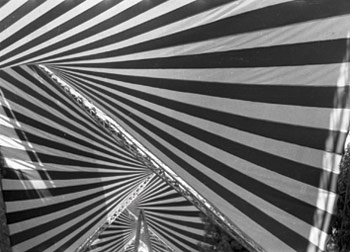Oskar Hansen
dal 9/9/2005 al 16/10/2005
Segnalato da
9/9/2005
Oskar Hansen
Zacheta National Gallery of Art, Warsaw
To See the World. The show presents the artist's last project completed before his death on 11 May 2005. Fragments of paintings will be arranged in the front of the main entrance to the gallery displaying time-space relationships. Above them, a 'roadblock spikes' structure will appear to frame the sky and integrate the exterior with the interior. Curated by Jola Gola.

To See the World
Curator Jola Gola
Cooperation at Zacheta Anna Muszynska
The theories of Oskar Hansen, long based at the Academy of Fine Arts in Warsaw, have
had a tremendous impact on generations of students. Hansen’s teaching method relied
on developing perception and seeking individual answers to deceptively simple
questions and problems that he himself posed. The tasks he gave in class left
students with a wide range of choices, and his strategy of gradually increasing the
level of difficulty was a stimulus for the imagination.
“To See the Worldâ€, an exhibition at Zacheta National Gallery of Art, accompanied by
a publication bearing the same title, presents the artist’s last project completed
before his death on 11 May 2005. Fragments of paintings will be arranged in the
front of the main entrance to the gallery displaying time-space relationships. Above
them, a “roadblock spikes†structure will appear to frame the sky and integrate the
exterior with the interior, attracting viewers inside. The structure is a reference
to the artist’s first solo exhibition in Salon “Po Prostu†at the Jewish Theatre in
Warsaw (1957). Several rooms will feature some of Hansen’s paintings that have not
been on public display since the time of the first exhibition, and another will
feature a space-organizing structure – a rounded shape primarily intended as a
background for man and (in keeping with as the artist’s original wish) for Hansen’s
students, who will present their works here during the exhibition. The exhibiti
on will also feature some of the “apparatuses†constructed by the artists, i.e.
devices formerly used in his classes.
With its space-integrating structures and densely displayed paintings, the
exhibition leads up to a large, empty space with a single armchair in the middle and
two clocks ticking out of sync on two opposite walls. When making drafts for the
exhibition the artist was already aware of his fast-approaching death, and the last
room was intended to provoke reflection on the passage of time.
The exhibition and the book have been prepared in cooperation with the Museum of the
Academy of Fine Arts in Warsaw that houses Oskar Hansen’s collection.
Image: Polish Pavilion at the Izmir International Fair in Turkey, Oskar Hansen with Lech Tomaszewski, 1955, photo artist's archive, Warsaw Academy of Fine Arts Museum collection.
Zacheta National Gallery of Art
pl. Malachowskiego 3 - Warsaw



